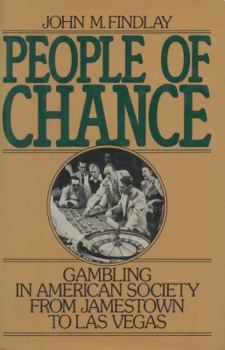People of Chance: Gambling in American Society from Jamestown to Las Vegas
In 1978 the Reverend Billy Graham himself consecrated Las Vegas's place in the American cultural mainstream by taking his "crusade for Christ" there. He found the resort "a nice place to visit," and pointed out that, while he did not gamble himself, the Bible said nothing definitive against the practice. This book is a social history of American gambling in a series of frontier settings ranging from seventeenth-century Jamestown to twentieth-century...
Format:Hardcover
Language:English
ISBN:0195037405
ISBN13:9780195037401
Release Date:March 1986
Publisher:Oxford University Press, USA
Length:278 Pages
Weight:1.45 lbs.
Dimensions:0.9" x 6.4" x 9.6"
Customer Reviews
1 rating
An anthropological and social history of American gambling
Published by Thriftbooks.com User , 20 years ago
The focus of "People of Chance: Gambling in American Society from Jamestown to Las Vegas" is indeed on the affinity between gambling and frontier societies. John M. Findlay, then an Assistant Professor of United States History at The Pennsylvania State University, points to a quotation from Alexis de Tocqueville, who offered this speculation on the American character: "Those who live in the midst of democratic fluctuations have always before their eyes the image of chance, and they end by liking all undertakings in which chance plays a part." Following de Tocqueville's lead, Findlay focuses on the American fascination with games of chance as a key to our natural culture, tracing the development of a distinctly American style of gambling through more than 350 years of history from 17th-century Jamestown to 20th-century Las Vegas.The central thesis here is that both gambling and frontier societies thrived on high expectations, risk-taking, opportunism, and movement. Consequently, gambling gained an acceptance on the frontier that it did not have in more settled parts of the nation. While Easterners bet too, they did not do it as publicly or adventurously as Westerners. The first half of the book details gambling in the colonial and early national frontiers, on the Mississippi River, and in the California Gold Rush. One of the most interesting arguments in this section is how each generation of westward-moving Americans first attempted to imitate the betting practices of the east, usually English style horse-racing and lottery schemes, but ended up modifying them for the American temperament. This becomes epitomized by the refinement in the old Southwest between 1800 and 1848 when professional gamblers, operating in towns and riverboats all along the Mississippi, popularized casino games. In the mining frontiers of California and the Far West, casino gambling became a short-lived, high-volume industry, embodying the Gold Rush mentality until society eventually become more civilized. Of course, that did not mean that this was the end of gambling in the West, just that it had to be transformed into something more acceptable for American society in the late 20th century. The last half of the book focuses on the rise of Las Vegas as the ultimate American resort destination. Findlay argues that Las Vegas is the culmination of almost four centuries worth of westward migration and chance-taking by Americans. As such, Las Vegas is the living link between America's frontier past and the contemporary, forward-looking values of the Sunbelt culture defined by California, which is consistent with Tom Wolfe's "super-hyper-version" of the whole new way of life that Americans created in the period after World War II. In his Epilogue Findlay gets to touch on the meteoric rise of Atlantic City as the rival of Las Vegas, which embodies the newfound belief that gaming now had a more legitimate place in American life. Most readers will appreciate the histo






